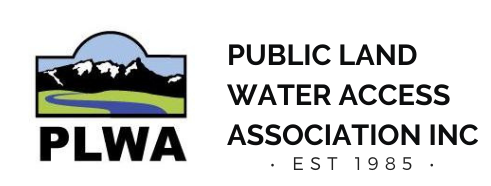
Planned Giving
Use MSU’s tool below to find out where your assets will go if you do not currently have a will.
Bequests
Using your will to make a bequest is simple and straightforward. Let your advisor know your wishes and they will put the appropriate language in your will. If you already have a will, there is no need to rewrite it to include PLWA; your lawyer can add a bequest through a simple codicil.
The quickest way to make a bequest to PLWA is by using our will writing tool. The process takes less than 20 minutes to complete.
Various bequest options (and suggested language that might be helpful to you and your advisor) allow you to:
1) Take care of your loved ones first, then leave all, or a percentage of, the remainder of your estate to PLWA.
I give and bequeath to the Public Land Water Access Association, Inc., 2100 Fairway Dr. Suite 211, Bozeman, MT 59715 (Federal Tax ID Number 81-0429139) all (or state a percentage) of the rest, residue, and remainder of my estate, both real and personal.
2) State your intention by leaving a specific amount (or specific percentage of your total estate) to PLWA.
I give and bequeath to the Public Land Water Access Association, Inc., (address and Fed ID number) the sum of $______.
Or
I give and bequeath to the Public Land Water Access Center, Inc., (address and Fed ID number) ___ percent of my estate.
Make your gift to PLWA contingent on other conditions being met, such as having a loved one predecease you.
If (insert name) is not living at the time of my demise, I give and bequeath to the Public Land Water Access Association, Inc., (address and Fed ID number) the sum of $______.
Or you may say “all of my estate” or “__ percent of the remainder of my estate.”
Retirement Account
If family members or friends are beneficiaries of your retirement funds, they could receive as little as 25% of your hard-earned money. Retirement accounts like IRAs, Keoghs, and 401(k) plans are taxed as income to your heirs, and in addition may be subject to estate tax. Alternatively, you can name the Public Land Water Access Association as beneficiary of your retirement funds and make other estate provisions for loved ones. That way, the entire designated amount passes to PLWA tax-free, and your gift is fully deductible for estate tax purposes. You may designate
Your entire retirement account;
A set dollar amount;
A percentage of your total retirement funds;
An amount contingent on other conditions being met, such as having a loved one predecease you.
Consult your financial advisor or your employer’s human resources department to get the simple form to designate the Public Land Water Access Association (Federal Tax ID Number 81-0429139) as a beneficiary of your retirement account.
Charitable Remainder Trust
Do you have valuable assets, such as appreciated stocks or a second home, that are “tied up” and not producing income? Would you like to have additional income for yourself, your spouse, a parent, or a child? Would you like to leave a generous gift to PLWA? If your answer is “all of the above,” then a charitable remainder trust may be the perfect choice for you.
Your assets (e.g. cash, stock, real estate) are used to create a trust fund, which is then invested.
You decide whether to base your payments on a percentage of the initial trust (Annuity) or a percentage of the trust’s value as it is revalued annually (Unitrust). Scheduled payments then come to you over the course of your lifetime or the trust period.
Afterwards, remaining assets pass to PLWA and provide a wonderful legacy for your environmental interests.
In addition to providing income, a charitable remainder trust could have double tax benefits for you: 1) You receive an immediate income tax deduction for a portion of the trust’s value; 2) You bypass capital gains taxes for appreciated assets. Speak to your estate planner or financial adviser to establish your charitable lead trust.
Charitable Lead Trust
Through a charitable lead trust, you can support the Public Land Water Access Association generously for your lifetime or a specified number of years—and then reclaim the trust assets yourself or pass them along to your heirs. Here’s how it works:
You place cash, stock, or other assets into a trust, which is invested to generate revenue.
A set amount or percentage of the investment returns are paid to PLWA, which uses your gift to support important southern conservation projects.
When the trust ends, the remaining funds are passed back to you or on to your beneficiaries.
Establishing a charitable lead trust can have tax benefits, particularly regarding estate tax reductions for your heirs. Speak to your estate planner or financial adviser to establish your charitable lead trust.




